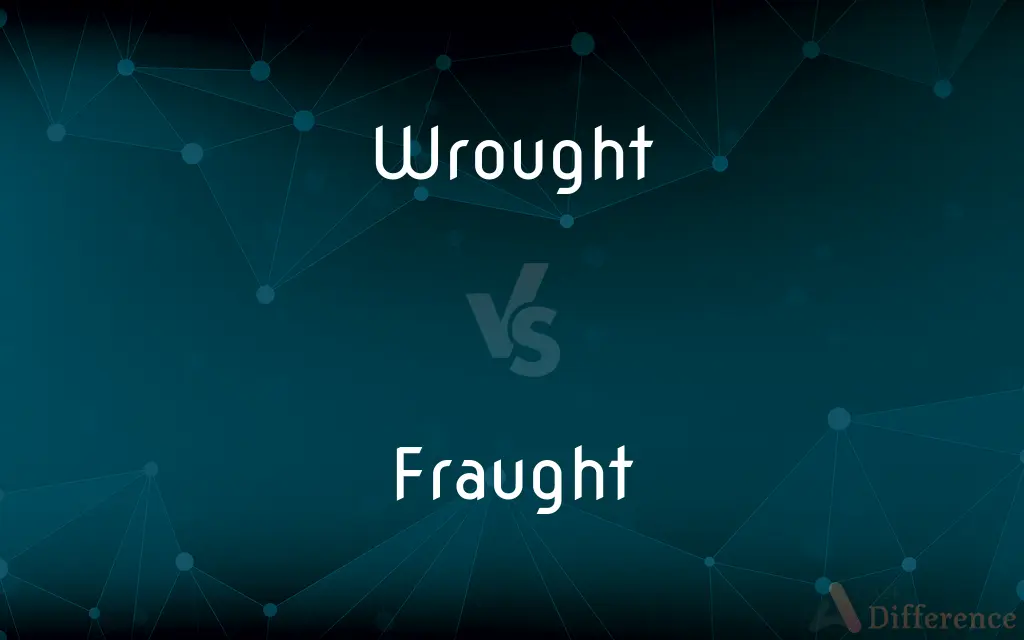Wrought vs. Fraught — What's the Difference?
By Maham Liaqat & Fiza Rafique — Updated on May 9, 2024
Wrought refers to something created or shaped, often through metalworking, while fraught implies being filled with tension or anxiety.

Difference Between Wrought and Fraught
Table of Contents
ADVERTISEMENT
Key Differences
Wrought is primarily used to describe materials (especially metal) that have been worked into a specific shape or form, suggesting craftsmanship and manual effort. On the other hand, fraught is used to describe situations, experiences, or even relationships that are laden with stress or fraught with emotional complexity.
Wrought iron, for example, is known for its durability and malleability under heat, which allows it to be used in a variety of decorative and structural applications. Whereas, a decision can be fraught with peril, indicating that it is filled with risks and potential problems, highlighting the emotional weight rather than physical characteristics.
In artistic contexts, wrought can describe a piece meticulously crafted, emphasizing the care and detail put into its creation. Conversely, a narrative can be described as fraught if it contains high tension or drama, underscoring the emotional or psychological depth rather than the physical form.
When discussing historical artifacts, "wrought" details the methods of creation and the era's technological capabilities. In contrast, historical periods can be fraught with war or economic hardship, focusing more on the pervasive challenges people faced rather than the physical manifestations.
In modern usage, wrought might appear less frequently and typically in set phrases like "wrought iron" or "wrought havoc," whereas fraught is increasingly common in describing complex issues like negotiations or relationships, which are emotionally or logistically challenging.
ADVERTISEMENT
Comparison Chart
Meaning
Worked into shape; crafted
Filled with or causing stress
Usage in Context
Predominantly physical objects
Emotional, psychological states
Common Collocations
Wrought iron, finely wrought
Fraught with danger, fraught relationship
Etymology
Middle English, from Old English ‘wroht’
Middle English ‘fraughten’
Examples
Wrought jewelry, wrought artwork
Fraught meeting, fraught atmosphere
Compare with Definitions
Wrought
Formed by hammering or bending.
The blacksmith exhibited a beautifully wrought iron gate.
Fraught
Characterized by many problems or difficulties.
The project was fraught from its inception.
Wrought
Produced or brought about.
The new management wrought changes throughout the company.
Fraught
Laden with something.
The atmosphere was fraught with tension as the negotiations began.
Wrought
Decorated or embellished.
The wrought silverware caught everyone's eye at the exhibition.
Fraught
Filled with (something undesirable).
The journey was fraught with peril.
Wrought
Caused or effected.
The scandal wrought havoc in his career.
Fraught
Associated with undesirable circumstances.
His tenure as manager was fraught with controversies.
Wrought
Carefully crafted or delicately made.
The narrative of the film was finely wrought with intricate details.
Fraught
Causing or having a lot of emotional stress or worry.
The weeks leading up to the trial were fraught for her family.
Wrought
(of metals) beaten out or shaped by hammering.
Fraught
Filled with a specified element or elements; charged
An incident fraught with danger.
An evening fraught with high drama.
Wrought
Made or fashioned in the specified way
Well-wrought pop music
Fraught
Marked by or causing distress; emotional
"an account of a fraught mother-daughter relationship" (Francesca Simon).
Wrought
A past tense and a past participle of work.
Fraught
Freight; cargo.
Wrought
Put together; created
A carefully wrought plan.
Fraught
(obsolete) The hire of a ship or boat to transport cargo.
Wrought
Shaped by hammering with tools. Used chiefly of metals or metalwork.
Fraught
(obsolete) Money paid to hire a ship or boat to transport cargo; freight
Fraught money
Wrought
Having been worked or prepared somehow.
Is that fence made out of wrought iron?
Fraught
(obsolete) The transportation of goods, especially in a ship or boat.
Wrought
Simple past tense and past participle of work
What hath God wrought?
Fraught
(obsolete) A ship's cargo, lading or freight.
Wrought
(see usage notes) wreak
Fraught
(Scotland) A load; a burden.
Wrought
Worked; elaborated; not rough or crude.
Fraught
(Scotland) Two bucketfuls (of water).
Wrought
Shaped to fit by or as if by altering the contours of a pliable mass (as by work or effort);
A shaped handgrip
The molded steel plates
The wrought silver bracelet
Fraught
To load (a ship, cargo etc.).
Fraught
To form the cargo of a vessel.
Fraught
(of a cargo-carrier) Laden.
Fraught
Loaded up or charged with; accompanied by; entailing.
Fraught
(with with) Furnished, equipped.
Fraught
Distressed or causing distress, for example through complexity.
A fraught relationship; a fraught process
Fraught
A freight; a cargo.
Fraught
Freighted; laden; filled; stored; charged.
A vessel of our country richly fraught.
A discourse fraught with all the commending excellences of speech.
Enterprises fraught with world-wide benefits.
Fraught
To freight; to load; to burden; to fill; to crowd.
Upon the tumbling billows fraughted rideThe armed ships.
Fraught
Marked by distress;
A fraught mother-daughter relationship
Fraught
Filled with or attended with;
Words fraught with meaning
An incident fraught with danger
A silence pregnant with suspense
Common Curiosities
How does "fraught" primarily differ in usage from "wrought"?
Fraught is typically used to describe situations or states that are filled with tension, stress, or complexities, unlike the physical focus of wrought.
What does it mean if a plan is described as "fraught"?
If a plan is described as fraught, it implies that it is filled with risks, problems, or stress.
Is "wrought" still commonly used today?
Wrought is less commonly used today and often appears in specific contexts or set phrases.
What are some common phrases that include the word "wrought"?
Common phrases include "wrought iron" and "finely wrought."
What are synonyms for "fraught"?
Synonyms for fraught include filled with, laden with, and full of.
How is "fraught" commonly used in modern language?
Fraught is commonly used to describe emotionally charged or complex situations.
What is the primary context in which "wrought" is used?
Wrought is mainly used in contexts involving physical objects that have been manually crafted or shaped, especially metals.
Can "wrought" and "fraught" be used interchangeably?
No, wrought and fraught cannot be used interchangeably as they pertain to different contexts—physical crafting versus emotional stress.
Are there any synonyms for "wrought"?
Yes, synonyms for wrought include crafted, shaped, and forged.
Can "wrought" refer to non-metal objects?
Yes, wrought can refer to any material or object that has been carefully crafted, though it is most often associated with metal.
Share Your Discovery

Previous Comparison
Deviant vs. Devious
Next Comparison
Sluice vs. WeirAuthor Spotlight
Written by
Maham LiaqatCo-written by
Fiza RafiqueFiza Rafique is a skilled content writer at AskDifference.com, where she meticulously refines and enhances written pieces. Drawing from her vast editorial expertise, Fiza ensures clarity, accuracy, and precision in every article. Passionate about language, she continually seeks to elevate the quality of content for readers worldwide.
















































